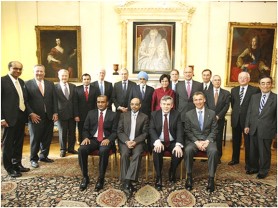President Bharrat Jagdeo yesterday attended a high-level meeting in London on how US$100 billion annually for developing countries by 2020 can be raised, as agreed in the recent Copenhagen Accord.

Jagdeo was appointed to the high-level panel by UN Secretary General Ban ki-Moon to consider financing options. In London, Jagdeo joined Prime Ministers Gordon Browne of the UK, Meles Zenawi of Ethiopia and Jens Stoltenberg of Norway, the other members of the committee. No details were available on the outcome of this meeting.
Earlier in the day, President Jagdeo attended the launching of the UK’s International Climate Change Action Plan. He joined UK’s Energy and Climate Change Secretary Ed Miliband for the launch of the document which sets out what must be done so that climate finance identified at Copenhagen begins to flow, a press release from the UK High Commission said yesterday.
The launch of “Beyond Copenhagen: The UK Government’s International Climate Change Action Plan” came hours before the first meeting of the UN Secretary-General’s High Level Advisory Group on Climate Finance. That meeting was co-chaired by Britain’s Prime Minister Brown and included President Jagdeo, among others.
The release noted that Prime Minister Brown is determined to use the meeting to try and unblock critical negotiations on long-term finance. This is key to helping poor countries adapt to climate change, to securing greater emissions reductions by developing countries and to achieving a legally-binding climate treaty.
A legally-binding treaty is crucial for limiting global temperature rises to no more than two degrees, but as negotiations restart towards this, the UK government is determined to lock in the emissions reductions already agreed in the Copenhagen Accord, the release stated.
‘Beyond Copenhagen’ also sets out what must be done so that commitments that countries made to tackle their emissions are delivered. It focuses too on ways to ensure that new life is breathed into the quest for a legally binding international treaty.
Guyana had gained attention at the Copenhagen Summit on Climate Change in December 2009 when President Jagdeo promoted a Low Carbon Development Strategy, or LCDS. He had presented the LCDS to fellow heads of state at the Copenhagen Summit, arguing that Guyana’s need to develop economically was at odds with environmentally sustainable policies unless the United Nations and/or developed nations offered assistance to Guyana.
Sustainable development which incorporates a low carbon development strategy, he contended, could meet both the need to reduce carbon emissions worldwide and promote Guyana’s economy.
The UK government’s “Beyond Copenhagen” expresses the view that low carbon transformation can be a major driver of economic growth and job creation, in the UK, in Europe and globally. In it, the release stated, the UK government makes clear that it wants to build on the strengths of the Kyoto Protocol, that it is open to extending the agreement as a way of getting a legal deal and it is in favour of strengthening the UN decision-making process that was so frustrating at Copenhagen. It also emphasizes that the UK is pushing for the EU to increase its plans to cut emissions in line with comparable moves elsewhere.
The release quoted Miliband as saying “we’ve got to dust ourselves down and kick-start efforts to get a global deal, get the climate financing flowing and make sure the cuts promised by countries happen. We need to do this, not just for environmental reasons, but also for economic ones.”
The UK government yesterday became the first in the world to publish plans that will set out how every major department will address the challenge of climate change in the UK, the release added.




